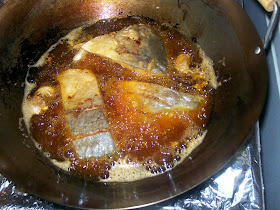My mother LOVES this type of bean, it's her overall favorite and since the weather was cold I was craving a heavy Cuban/ Spanish bean stew, I thought "Why not make a Cuban or Spanish bean stew using these beans, my mother would love it" and so this recipe came to be. I decided to cook these delicious beans with Calabaza and potatoes typical of a Cuban bean stew, but sort of a fusion with Galician stew because I wanted to add some greens, but not collards or chard I chose Spinach. All this married with a delicious sofrito and smokey hints of paprika and cumin. Plus I had a wonderful ham bone and some ham steaks laying around :)
Ingredients:
-1 lbs./ 2 cups frijoles peruanos (Mayacoba beans)
 -1 ham bone
-1 ham bone-1 lbs. ham cut into chunks
-2 smoked sausages (preferably Spanish Sausage as in Spain)
-1/4 cup extra- virgin olive oil
-1 bell pepper minced
-1 onion minced
-6 cloves garlic finely minced
-1 can 8 oz. tomato sauce (or 3 fresh grated tomatoes or finely diced)
-1 heaping teaspoonful sweet smoked spanish paprika
-1/2 heaping teaspoonful ground cumin
-2-3 bay leaves
-1 lbs. butternut squash cut into peeled, cut into 1 inch chunks
-3 small potatoes, peeled washed, cut into 1 inch chunks
-1 lbs. spinach (cleaned well, washed several times, drained, and coarsely chopped or use frozen)
Directions:
(1) In a large (I really do mean large) wash the beans several times, pick through them to see if there are any stones, and drain well, then add ham bone and ham chunks into the pot with beans and cover with enough water to barely cover ham bone and beat (you want the beans to be covered 2-3 inches in water) bring to a boil,
 cover and simmer over low until very tender (about 1 1/2- 2 hrs)
cover and simmer over low until very tender (about 1 1/2- 2 hrs) (2) In the mean time prep all your vegetables, and make a sofrito (this is what flavors most Cuban dishes) start by heating olive oil over medium high, brown your sliced sausages and set aside, to that same oil add onion and bell pepper when translucent about 5 minutes, add garlic and cook down another 2 minutes, then stir in the paprika, cumin, and bay leaves about 30 seconds, then tomato sauce, give another good stir and let it reduce to a thick paste about 10 minutes over medium heat. This base will make everything taste amazing!
(2) In the mean time prep all your vegetables, and make a sofrito (this is what flavors most Cuban dishes) start by heating olive oil over medium high, brown your sliced sausages and set aside, to that same oil add onion and bell pepper when translucent about 5 minutes, add garlic and cook down another 2 minutes, then stir in the paprika, cumin, and bay leaves about 30 seconds, then tomato sauce, give another good stir and let it reduce to a thick paste about 10 minutes over medium heat. This base will make everything taste amazing! (3) When beans are tender, add your sofrito to the beans
(3) When beans are tender, add your sofrito to the beans here are all my veggies prepped (the spinach was frozen, we actually bought a lot of spinach when it was on special and cleaned, blanched it and stored it in container in freezer to have it ready for whenever we needed, you may use fresh)
here are all my veggies prepped (the spinach was frozen, we actually bought a lot of spinach when it was on special and cleaned, blanched it and stored it in container in freezer to have it ready for whenever we needed, you may use fresh) (4) Add your potatoes, squash and sausage to the stew, and bring to a boil then simmer about 15- 20 minutes until tender (to test for tenderness check with a fork, if you can pierce it it's good) the last 5-7 minutes add your spinach and bring to a boil. Give a good stir. Then when everything is cooked turn off heat :)
(4) Add your potatoes, squash and sausage to the stew, and bring to a boil then simmer about 15- 20 minutes until tender (to test for tenderness check with a fork, if you can pierce it it's good) the last 5-7 minutes add your spinach and bring to a boil. Give a good stir. Then when everything is cooked turn off heat :) here's another snap shot. Serve with bread or rice :D
here's another snap shot. Serve with bread or rice :D PLEASE NOTE:
PLEASE NOTE:*I highly suggest anyone to give this bean stew a try, if your kosher or can't eat pork products use some cubed beef meat and some beef bones to substitute the ham products. Oh and also you can use an all beef smoked sausage :)
*You can make this stew using chickpeas/ garbanzo beans, white northern beans, or lentils which was what I was going to do today, but I felt like cooking it with these creamy beans. If using lentils remember they cook quick so please adjust cooking times and such. Like for lentils I would cook them 30 minutes, then start adding everything and not let them cook longer than an hour.





